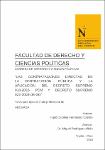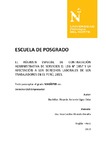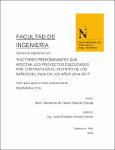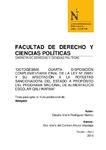Mostrar el registro sencillo del ítem
Las contrataciones directas en la contratación pública y la aplicación del Decreto Supremo 018-2002-PCM y Decreto Supremo 022-2008-DE-SG
| dc.contributor.advisor | Rodríguez Albán, Miguel | |
| dc.contributor.author | Fernández Castillo, Ingrid Carolina | |
| dc.date.accessioned | 2017-05-29T15:14:21Z | |
| dc.date.available | 2017-05-29T15:14:21Z | |
| dc.date.issued | 2016-06-20 | |
| dc.identifier.citation | Fernández, I. C. (2016). Las contrataciones directas en la contratación pública y la aplicación del Decreto Supremo 018-2002-PCM y Decreto Supremo 022-2008-DE-SG [Tesis de licenciatura, Universidad Privada del Norte]. Repositorio de la Universidad Privada del Norte. https://hdl.handle.net/11537/10096 | es_PE |
| dc.identifier.other | 346.023 FERN 2016 | es_PE |
| dc.identifier.uri | https://hdl.handle.net/11537/10096 | |
| dc.description.abstract | RESUMEN En el Perú las Contrataciones Públicas se rigen por el Decreto Legislativo Nº 30225 y su Reglamento por Decreto Supremo Nº 350-2015- EF, normas que regulan el buen funcionamiento de las contrataciones, respetando los principios estipulados en dicho Decreto Legislativo, para tener un proceso de selección transparente, y con libre concurrencia de postores, con igualdad de trato y favoreciendo la eficiencia del Estado en cuanto a precio y calidad de lo que se contrate. El Decreto Legislativo, también establece las exoneraciones de dichos procesos de selección, exoneraciones que deben darse de manera excepcional y con objetividad. Con fecha 11 de julio del 2014, se dictó la nueva ley de Contrataciones del Estado Ley N° 30225 y el año 09 de Enero del año 2016 entra en vigencia su Reglamento por Decreto Supremo N° 350-2015-EF ; La Ley Contrataciones del Estado en el artículo 27 literal k incluye la contratación de abogados para la defensa de funcionarios públicos por diferentes hechos propios del ejercicio de su función pública, al amparo de los Decretos Supremos Nº 018-2002 PCM y Nº 022-2008-DE/SG. Ello constituiría una desnaturalización de las exoneraciones, por no cumplir con los requisitos necesarios para poder referirnos a exoneraciones y por no encontrarle razonabilidad alguna para dichas contrataciones que lo único que hacen es beneficiar al funcionario que ha perjudicado a la institución pública con su mal proceder, en tanto que por dicha norma se excluye de la obligación de efectuar las referidas contrataciones mediante la convocatoria a un proceso de selección clásico, sino que la misma se realizará de manera directa. Ello vulnera algunos principios consignados en la Ley de Contrataciones del Estado como el de Trato Justo e igualitario, de Libre Concurrencia y Competencia y el principio de Eficiencia, ya que por considerarse exoneraciones a dichos servicios de defensa legal, no se permite la concurrencia de postores y que éstos puedan ser tratados con igualdad ante la Administración Pública y se impide al Estado que cumpla con su función de poder escoger entre mejor calidad y precio para contratar. | es_PE |
| dc.description.abstract | ABSTRACT In Peru Public Contracts are governed by Legislative Decree No. 30225 and its Regulations by Supreme Decree No. 350-2015- EF, rules governing the proper functioning of procurement, respecting the principles stipulated in the Legislative Decree, to have a process transparent selection, and free competition of bidders, with equal treatment and promoting the efficiency of the state in terms of price and quality of what is hired. Legislative Decree also establishes exemptions from such selection processes, exemptions that must be exceptionally and objectively. On July 11, 2014, the new Law on Government Procurement Law No. 30225 and year 9 January 2016 was issued goes into effect the Regulations by Supreme Decree No. 350- 2015-EF; The Government Procurement Law Article 27 literal k includes hiring lawyers to defend public officials for different facts of the exercise of their public function, under Supreme Decree No. 018-2002 and No. 022-2008- PCM DE / SG. This would constitute a distortion of exonerations, not meet the necessary requirements to refer to exonerations and not finding reasonability whatsoever for these contracts that the only thing they do is benefit the official who has hurt public institution with its wrongdoing, whereas by that provision it is excluded from the obligation to make the aforementioned contracts by convening a classic selection process, but it will be done directly. This violates some principles set forth in the Law on Government Procurement such as Fair Treatment and egalitarian, free competition and Competition and the principle of efficiency, and that considered exemptions to these legal advocacy services, competition of bidders are not allowed and that they can be treated equally before the Public Administration and the State to fulfill its function of being able to choose between best quality and price to hire is prevented. | es_PE |
| dc.description.uri | Tesis | es_PE |
| dc.format | application/pdf | es_PE |
| dc.language.iso | spa | es_PE |
| dc.publisher | Universidad Privada del Norte | es_PE |
| dc.rights | info:eu-repo/semantics/embargoedAccess | es_PE |
| dc.source | Universidad Privada del Norte | es_PE |
| dc.source | Repositorio Institucional - UPN | es_PE |
| dc.subject | Contratación | es_PE |
| dc.subject | Contratos públicos | es_PE |
| dc.subject | Legislación | es_PE |
| dc.title | Las contrataciones directas en la contratación pública y la aplicación del Decreto Supremo 018-2002-PCM y Decreto Supremo 022-2008-DE-SG | es_PE |
| dc.type | info:eu-repo/semantics/bachelorThesis | es_PE |
| thesis.degree.grantor | Universidad Privada del Norte. Facultad de Derecho y Ciencias Políticas | es_PE |
| thesis.degree.level | Título Profesional | es_PE |
| thesis.degree.discipline | Derecho y Ciencias Políticas | es_PE |
| thesis.degree.name | Abogado | es_PE |
| dc.publisher.country | PE | es_PE |
| dc.subject.ocde | https://purl.org/pe-repo/ocde/ford#5.05.01 | es_PE |
| thesis.degree.program | Pregrado | es_PE |
| dc.description.sede | Trujillo El Molino | es_PE |
| renati.advisor.dni | 18076069 | |
| renati.advisor.orcid | https://orcid.org/0000-0003-2383-8896 | es_PE |
| renati.author.dni | 42608223 | |
| renati.discipline | 421056 | es_PE |
| renati.level | https://purl.org/pe-repo/renati/level#tituloProfesional | es_PE |
| renati.type | https://purl.org/pe-repo/renati/type#tesis | es_PE |
Ficheros en el ítem
Este ítem aparece en la(s) siguiente(s) colección(ones)
-
Tesis [824]






